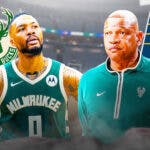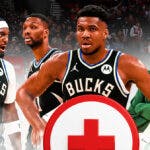Tuesday night's blowout win over the rebuilding Detroit Pistons ended a three-game losing streak for the Portland Trail Blazers, moving them to an even 11-11 over a quarter into the regular season. Reasons for Portland underperforming preseason expectations are numerous and varied.
Damian Lillard's career-worst slump to tipoff 2021-22 finally dissipated only for his nagging abdomen injury to flare up. The Blazers are still developing the mind-body meld it takes to play freely and without thinking while deploying new schemes on both sides of the ball. Rookie coach Chauncey Billups has continued tinkering with the playing rotation and specific lineup combinations, recently admitting he's still getting to know his players. A 22-game sample size, while substantial enough to yield meaningful takeaways, will inevitably be affected by random variance—especially for a team that relies on jump-shooting as much as Portland.
The revamped Blazers, clearly, remain a work in progress. But even acknowledging that convenient reality of an excuse doesn't suggest this team has all that much room to grow given the frustratingly familiar nature of its statistical profile.
Neil Olshey famously insisted at last season's closing presser, just days after parting ways with longtime coach Terry Stotts, that Portland's first-round playoff defeat to the short-handed Denver Nuggets and 29th-ranked defense wasn't a “product” of the roster. Lillard's subsequent wavering about his future in Rip City gave the front office latitude to make the significant personnel changes it's long avoided, but Olshey largely stayed the course instead. He answered Lillard's calls for upgrades by ending the controversial search for Stotts' replacement with his earmarked candidate, then remade the bottom half of the roster with a trio of minimum signings in free agency and trading another first-round pick for Larry Nance Jr.
Lillard, thankfully, has re-committed himself to Portland, but hardly due to improvement sparked by management's tweaks. The Blazers finished last season with basketball's second-best offense and second-worst defense. Six weeks into 2021-22, they're fourth offensively and 29th defensively, with a -0.1 net rating—nearly two full points worse than their mark a year ago, per NBA.com/stats.
The true test of Portland's new offense won't come until the playoffs, when Billups hopes his emphasis on tempo and movement will pay off most as defenses focus even more of their attention on Lillard and McCollum. Between their individual inconsistencies and the Blazers breaking years of old habits on the fly, there's even reason to be optimistic about their offensive prospects going forward.
But an elite offense was always going to be low-hanging fruit for this team. What stood to move Portland another rung up the championship pecking order this season were strides on defense, taken by not just Billups' more aggressive, active approach but the simple addition by subtraction of moving on from Carmelo Anthony and Enes Kanter.
There's a case to be made that shooting luck is artificially inflating the Blazers' defensive rating. Teams have little control over opponents' three-point shooting percentage, and they're at 38.6% from deep against Portland, second-best in the league, per Cleaning the Glass. Maybe that hot shooting cools down over the season's remainder.
On the other hand, the Blazers allow the fourth-most corner threes in the league and don't exactly boast the rangy, quick defenders needed to manage effective close-outs. Their struggles to consistently rotate with cohesive speed and precision against teams that prioritize triples and ping the ball from side to side were laid bare in Monday's blowout loss to the Utah Jazz.
Bailing on the base defense to play zone didn't help.
The silver lining of Portland's porous defense last season doesn't exist anymore, either.
Jusuf Nurkic is still an individual defensive bellwether, but the Blazers' starting lineup has a defensive rating 112.3, per Cleaning the Glass, in the 17th percentile among all five-man units league-wide. Groups that include Portland's three starting guards have been even worse, with a 115.9 defensive rating, almost a full eight points higher than a year ago.
Olshey bet over the offseason that the Blazers were close to real contention, favoring strategic shifts and bench touchups over dismantling the core he spent years building. Six weeks into the regular season, though, it's more obvious than ever that self-serving gamble was an even bigger one than truly rebuilding around Lillard would've been.
Barring a stunning degree of in-season improvement to come, here's hoping whoever is running the team next summer learns from Olshey's mistake.




